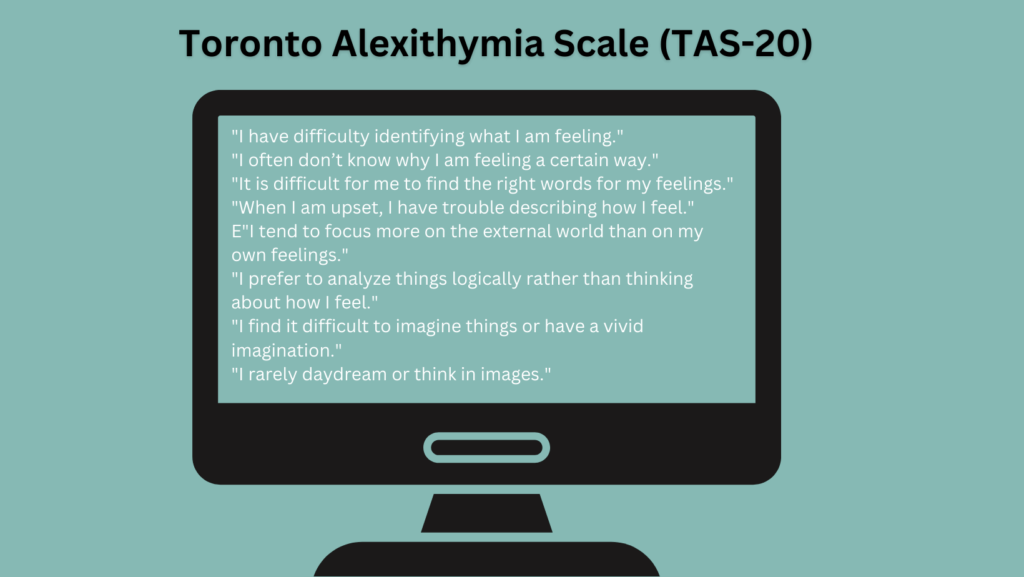Ever feel like you’re a robot when it comes to emotions? Like someone asks, “How are you feeling?” and you’re stuck thinking, Do I say ‘fine’? Is that even a feeling?
If that sounds familiar, you’re not alone. In fact, there’s a term for this: alexithymia. It’s a fancy word for people who struggle to identify or express their emotions. A study published in ScienceDirect found that around 10% of the population experiences alexithymia to some degree. That’s a lot of people walking around, unsure if they’re sad, tired or just hungry.
But it’s not just about being “bad with feelings.” Alexithymia can impact relationships, mental health and even physical well-being. It’s often linked to conditions like autism, depression and trauma which makes it more than just an occasional emotional blank slate.
Why does this happen? Is it how we’re wired? Or does the world we live in have something to do with it? in this blog, we’ll understand what alexithymia really is and everything surrounding it.
Table of Contents
What is Alexithymia?

Alexithymia is a term used to describe the difficulty some people have in identifying, understanding and expressing their emotions. It comes from Greek roots: “alexis” meaning “lack of” and “thymos” meaning “emotion” or “feeling.” Essentially, alexithymia is a term for people who struggle to name what they’re feeling or express it to others. It’s not that emotions aren’t there—they’re just harder to recognize. It’s like trying to speak a language without really knowing the words.”
Alexithymia vs. Emotional Numbness
It’s important to note that alexithymia isn’t the same as emotional numbness, though they can feel similar. Emotional numbness is a temporary state, often caused by stress, trauma or overwhelming emotions. It’s like a mental “shutdown” where you just can’t feel much of anything.
On the other hand, alexithymia is a long-term difficulty in recognizing and describing emotions, even when they’re present. It’s a more chronic, cognitive process, not just an emotional block. So, while emotional numbness is about a lack of feeling in the moment, alexithymia is about a deeper, ongoing struggle to understand and label your emotions in general.
In short, alexithymia doesn’t mean you’re emotionless but it means you’re disconnected from your emotions.
Signs and Symptoms of Alexithymia
Alexithymia is one of those things that’s easy to overlook because the signs are subtle, but they can really mess with how we understand and deal with our emotions. If you’ve ever felt like something’s wrong but just couldn’t put your finger on it, you might relate to what we’re talking about. Here’s a look at some common signs and symptoms.
- You feel something, but can’t figure out if it’s anxiety, stress or just hunger.
- Instead of saying, “I’m anxious,” you might just say, “I’m off” or stay quiet
- You might avoid talking about feelings, choosing to think things through logically instead of trusting your emotions.
- It can feel like you’re watching your life from the outside, unable to fully engage with your emotions.
- Since you can’t identify your emotions, it can be hard to know what you need to feel better making self-care difficult.
- You might overanalyze situations instead of just feeling through them, making decision-making harder.
Causes of Alexithymia
Alexithymia doesn’t just happen out of nowhere. Several factors can contribute to its development. Here are some of the main causes:
Genetic Predisposition
Some people might be born with a tendency towards alexithymia due to genetic factors. If you have a family history of emotional challenges or mental health issues, you may be more likely to experience alexithymia yourself. Research indicates that genetic factors can influence its development.
Impact of Early Trauma or Neglect
Childhood experiences are crucial in shaping emotional development. Early trauma, abuse or neglect can deeply affect how a person learns to manage emotions. Children who grow up in environments where their emotional needs are not met, ignored or dismissed may struggle later in life to identify or express their feelings.
Neurological and Cognitive Factors
Certain brain conditions or cognitive differences might impact emotional processing. Issues with how the brain handles emotional information can lead to difficulties in identifying and expressing emotions. For example, people with certain neurological conditions like autism spectrum disorder or those with brain injuries, may find it more difficult to identify and express emotions due to differences in how their brain processes emotional information.
Emotional Numbness vs. Alexithymia

Sometimes, it’s easy to confuse emotional numbness with alexithymia, but they’re not the same thing. Both can make you feel disconnected from your emotions, but the reasons behind them are different. Let’s break down what sets them apart and why alexithymia often gets misdiagnosed.
Key Differences Between the Two
- Emotional Numbness: This is when you feel like your emotions are shut off, almost like a protective barrier is in place. You might feel detached, but it’s not because you can’t identify your emotions. It’s because you’ve experienced something that made you shut down emotionally (like trauma or depression).
- Alexithymia: With alexithymia, it’s not about being numb; it’s about not being able to identify or express what you’re feeling in the first place. It’s like your emotional radar is broken. You might feel something, but you don’t have the language to describe it.
Why Alexithymia Often Gets Misdiagnosed
Alexithymia can easily be mistaken for other mental health conditions because its symptoms overlap with so many others. It might get confused with depression, anxiety or even autism because the emotional struggles look similar.
- Example: A person with alexithymia might show signs of depression, like withdrawal or a lack of emotional expression, but it’s not that they’re feeling depressed, they simply can’t access or communicate their emotions clearly.
Alexithymia and Autism: Is There a Connection?

As we now know alexithymia and autism can be connected in some way and it’s true that there are similarities. However, the relationship between the two is a bit more complicated than it seems. Here’s a closer look at how they overlap.
Alexithymia Among Individuals with Autism
Studies show that people with autism spectrum disorder (ASD) are more likely to experience alexithymia than the general population. This is because both conditions involve difficulties with emotional processing, though for different reasons.
According to the National Library of Medicine, around 50% or more of individuals with autism may also show signs of alexithymia. The inability to identify and express emotions can make it harder for them to connect with others and manage their emotions.
Shared Characteristics and How They Differ
There are some traits that alexithymia and autism share, but they aren’t exactly the same thing.
- Shared Characteristics: Both conditions involve difficulties with emotional recognition and communication. People with autism often have trouble reading social cues or understanding emotions in others, which can overlap with the challenges seen in alexithymia.
- How They Differ: The root causes are different. In autism, these emotional challenges stem from neurological differences in social processing and communication. In alexithymia, the issue is more about a cognitive or emotional barrier to identifying and expressing one’s own feelings, regardless of social understanding.
Emotional Intelligence vs. Alexithymia: Can You Develop It?
When it comes to understanding emotions, two terms often come up: emotional intelligence (EI) and alexithymia. They may sound similar, but they represent very different things. So, can someone with alexithymia develop emotional intelligence?
Emotional Intelligence (EI): This is the ability to recognize, understand and manage your emotions—and also understand others’ emotions. People with high EI are good at handling emotional situations, reading social cues and building strong relationships.
Alexithymia: On the flip side, alexithymia refers to the difficulty in identifying and expressing your own emotions. It’s not that you don’t have feelings, but you just can’t pinpoint or talk about them clearly.
While EI is about emotional awareness and regulation, alexithymia is the lack of those abilities. Even if you struggle with alexithymia, there are ways to develop better emotional awareness and grow your emotional intelligence over time
How does alexithymia affect relationships?
Since emotional understanding and communication are key in all relationships, alexithymia can cause misunderstandings and emotional distance. Here’s a closer look at how it affects relationships.
Personal Relationships: In close relationships, alexithymia can lead to frustration for both parties. A partner or friend might feel like they’re not being heard or understood because the person with alexithymia struggles to express their feelings. This can make communication feel one-sided and lead to emotional distance.
Professional Interactions: At work, not being able to express emotions can make it hard to connect with coworkers or supervisors. It may also affect teamwork and conflict resolution, as emotions are often central to effective collaboration.
Tips for Partners of Individuals with Alexithymia
- Be Patient: They may struggle to express their feelings, so don’t take it personally. Give them time.
- Ask Simple Questions: Instead of “How do you feel?”, try “What’s going on in your head?” to open up a conversation.
- Show Support in Small Ways: A hug, a kind word or just sitting together can help when words are hard to find.
- Don’t Push Too Hard: Let them talk when they’re ready, but don’t force the conversation.
- Consider Therapy: Professional help can guide both of you in understanding and improving emotional communication.
How is Alexithymia Diagnosed?

Diagnosing alexithymia involves a few steps to understand how you process emotions. There are a few different tools psychologists use to assess alexithymia. One of the most common is the Toronto Alexithymia Scale (TAS-20). Psychologists often use this to ask about your ability to identify and describe your emotions. Questions like “I’m often confused about my emotions” help determine how much you struggle with emotional awareness.
After taking the test, a psychologist or psychiatrist will go over the results. They might ask about your emotional history, childhood, relationships and how you deal with stress. They’ll also check for other conditions, like depression or anxiety, that might share symptoms with alexithymia.
Final Thought
Even though alexithymia can make emotions feel confusing and out of reach. But understanding it is the first step toward getting the help you need. It’s not always easy to recognize, especially when it overlaps with other conditions like autism or depression.
If you’re reading this and thinking, ‘That sounds like me,’ you’re not alone. Alexithymia might feel isolating, but understanding it is the first step toward healing. Start by talking to someone who gets it. Whether it’s a family member or a close friend. It’s okay to ask for help when they’re hard to understand and It’s never too late to start understanding your emotions better.
Frequently Asked Questions
Can alexithymia be cured?
There’s no “cure” for alexithymia, but it can definitely be managed. With support like therapy or emotional awareness training, you can learn to better express your feelings.
Is alexithymia a disorder or a personality trait?
Alexithymia isn’t a personality trait, but rather a difficulty with identifying and expressing emotions. It’s not considered a mental disorder on its own, but it often shows up alongside conditions like depression, autism or anxiety.
How common is alexithymia?
You’re not alone if you’re dealing with alexithymia. It affects about 10-15% of people, though many don’t realize it. It’s also more common in those with mental health conditions like depression or autism.
